Hatching Ducklings
Hatching
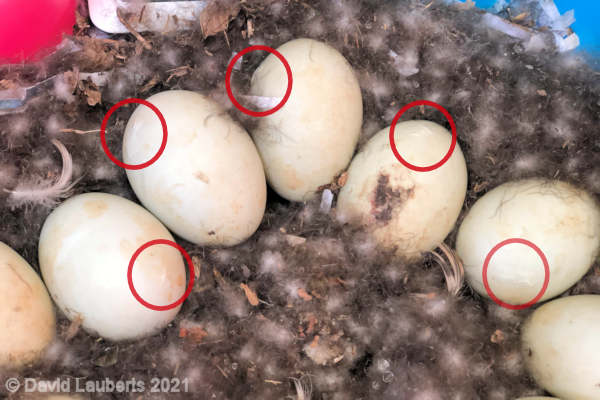
5 Pipped eggs 23rd April 2021
We were now starting to get our hopes up that we had done something right. After studying the eggs, a bit more we noticed there were 5 eggs that had pipped. In our case they were all eggs along one side, whether this was by luck, or because of incubator conditions, even though we had moved eggs around, was a matter for speculation.
Nothing much else appeared to happen the rest of the day, no more pipped eggs that we could see, no more action in the ones that had pipped. We read that hatching after pipping can take some time. Evening and bedtime came with still no progress. We thought that 5 out of 14 after all the troubles was perhaps not a bad success rate.
I woke up about 1:30 am and decided to have a look on the camera we had in the incubator- and there, to my delight was a duckling, staggering about the container amongst the eggs. My wife woke and we hurried downstairs to look on first hand as the others hatched. The thought of life coming into being in front of your eyes is quite mesmerising.
We were not as prepared as we should have been again, we hadn't read about what to do with hatched chicks (to be honest we did not have high hopes for any successes). Out came the phones and Google again to help us out. Things were happening with the eggs.
The first ('Donald', he continued to be the largest for several weeks and could be identified), staggered about briefly then appeared to be exhausted and rested amongst the eggs. He was initially quite wet looking and may only have just hatched before I looked at him through the camera. The bird box camera had decided to play up at that point and decided not to save any recordings and print the wrong date and time on what it did save over the next few hours till I got round to resetting it.
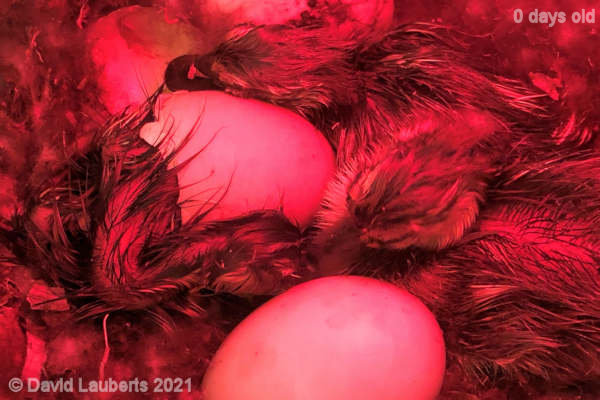
Number 3 hatching 3:53 am 24th April 2021
While we were researching (and having cups of tea) a second duckling started to work away on its pipping hole, first widening the hole so we could see its beak (and the yellow eye tooth at the end it had used to break into the air sac and then the shell to make the pip hole), after resting the hole got larger and the about 2:30am the top cracked all the way round (I think, depending on what you read and where, some people call this 'zipping', as in its like unzipping round the egg and opening) and the second duckling appeared. How they manage to get all that duckling into such a small space is beyond me!
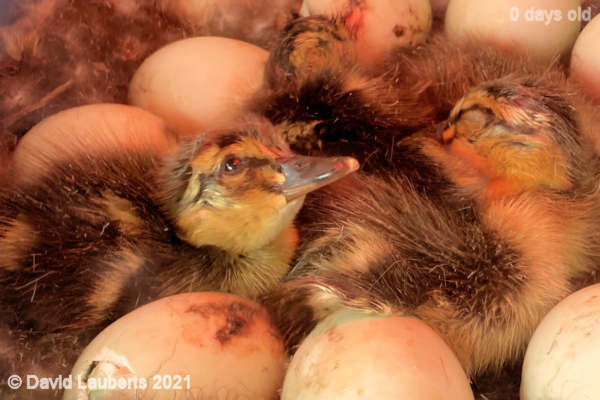
Waking up 8:09 am 24th April 2021
It was incredible hearing the ducklings 'chirp' while they were in the egg breaking out. That chirping noise was one sound that we would grow to love over the next several weeks as the ducklings would use it amongst themselves to re-assure each other, it was a very soft and restful sound. Perhaps they made the sound while still in the egg to let the mother know they were coming so she didn't abandon them still in the egg if she was thinking about moving off the nest.
Over the next hour the process repeated itself with a third egg, and then a fourth. Each one appearing to wait its turn (the third hatched about 3:50 am, the fourth about 4:45am). Then there was a short break at a fifth emerged at about 9:30am. All this time our own sleep was the last think on our mind as we watched the family take shape before us.
The tea (and a bacon sandwich), and the thrill of watching our little family hatch, kept us awake through the night and into the next morning. There was a lull in hatching activity mid-morning after the fifth at 9:30 am, perhaps three more had 'pipped' and were making chirping noises.
Our reading had suggested that you should leave them for about an hour to dry off and then move them into a slightly cooler brooding box, so during this break in hatching, we had a look round the house that we could use.
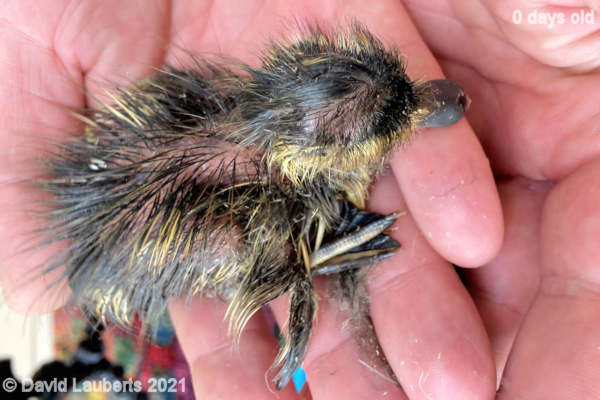
Transfer to the brooding box 10 am 24th April 2021
First few hours after hatching and brooding box
Bits and pieces came from all over the house and garage. It was a bit of an evolving beast, first a large plastic storage box out the garage, some 'anti slip' grid matting, newspaper, an old 'wheat neck warmer' bag, egg cartons, floating duck food, pestle and mortar, old halogen spotlight bulb, clean cloths, old Tupperware from kitchen and cupboards and a desk lamp from one of the kid's bedroom.
We soon had version 1 together with the newspaper on the bottom, anti-slip matt on top, with a cloth at one end with the red 'wheat warmer' under the lamp with a halogen bulb in it. We put the water at the other end in a shallow Tupperware container.
Food was an issue, the lack of preparation because we didn't think this egg hatching would be successful was telling. We googled and read to be careful what you feed young ducklings, particularly stuff containing too much calcium (to prevent 'Angel Wings' developing), so ordered some proper baby 'chick' crumb food from Amazon for next day delivery. In the meantime, we had some floating duck food from the previous year (from when we tried to go and see Jemima and her first brood) but it was not really the stuff for day-old ducklings. We also had a pestle and mortar we had just bought for the kitchen (must be the first time we ever used it!) which we then used to grind the pellets down and put milled food in the eggbox ends.
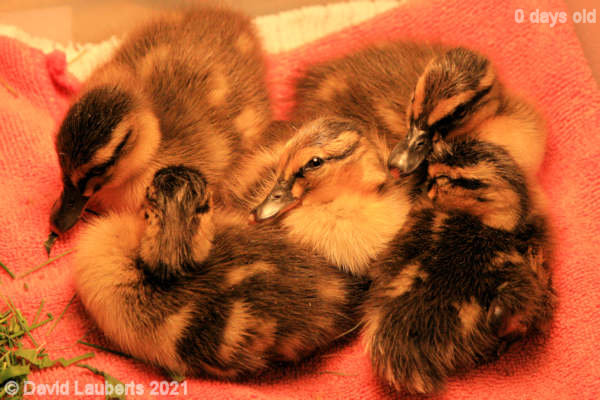
Getting comfortable 24th April 2021
Apparently fresh cut grass and dandelion leaves was good stuff to feed them as well. I never thought I would say or do it, but out I went with a pair of scissors and cut some fresh grass and dandelion leaves and cut it up to scatter on the bottom of the box. Plans evolve as you learn more. We saw a website that had the water container with pebbles in to stop them drowning, and suggested microfibre cloths were good to use. Out into the garage and all the car cleaning cloths (I am not very good at cleaning cars but have the stuff!) were commandeered a quick trip into the garden gave us some pebbles and everything was press-ganged into service.
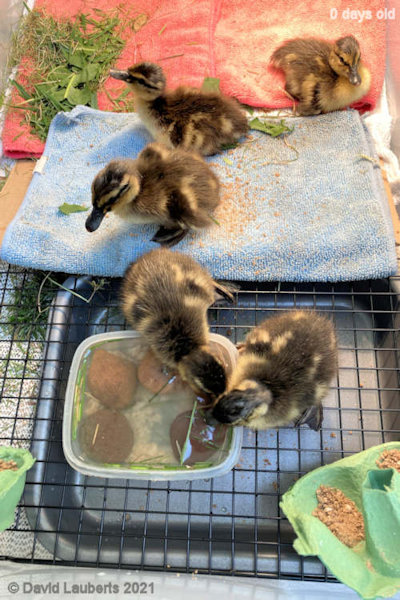
Brooding box V3 24th April 2021
It was time to transfer our 5 new foundlings into their new home. They seemed to take to it like 'ducks to water'(!) and were soon running around, pecking at food and grass, jumping into the water container to drink and get their feathers wet. Resting was also another popular, and frequent, activity.
We started to try and control the temperature under the lamp and measure it but quickly stopped this, the ducklings would find their own comfortable space. If they were just standing under the lamp (showing that they were too cold) you could always lower the lamp.
Ducklings are self-reliant after hatching in the wild and forage for themselves in their family group, usually led around and protected by the mother. We had seen the previous year that within hours of hatching the mother would take them into water to forage and swim and lead them round the garden to experiment eating things and keep them warm around her.
Their quarters continued to develop as we found other people's ideas, such as putting the water on a cooling tray on a baking tray. Ravaging the kitchen again we found a suitable tray and cooling tray that would do but also ordered some more suitable ones from our emergency friend Amazon to arrive the next day. We soon took out the 'wheat warmer' as well because the ducklings did not seem interested in sitting on it really and were more comfortable finding the right spot under the lamp on the microfibre cloth.
They also don't like slippy ramps, we found that putting a microfibre cloth on ramps helped them get up tremendously.
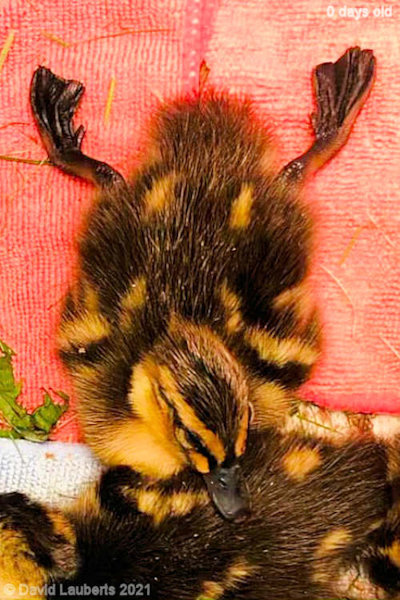
Is this how you rest? 24th April 2021
Our new little friends spent an active day in the brooding box, while in the incubation box the egg that had seemed so promising in being the next to hatch ominously quietened down during the day, with just a little air hole in the shell, but a seventh had developed a pip mark and became more active towards the evening.
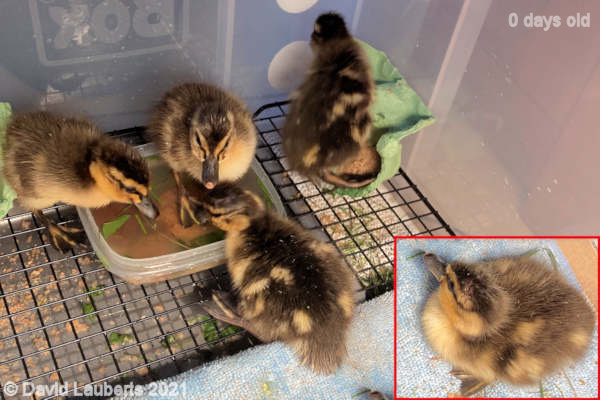
Playing before bedtime 7:53pm 24th April 2021
In between studying their antics, we were debating, and googling advice, on the next steps in both feeding, keeping and what things we should or should not be allowing them to do. We were conscious of Jemima and her brood last year, she had not appeared to stay on her nest long with the ducklings before she moved off the nest (we didn't believe she stayed a whole day and night on the nest after the first one hatched as the dried off, more probably they hatched either very late evening or during the night and she moved off after about 12 hours.) She also had them out on the water very soon afterwards and foraging round the garden and ponds.
The online advice we could find was more cautious and suggested you kept the ducklings inside for the first couple of days, we were not so sure after watching Jemima the previous year but as my wife pointed out she was there to show them what to do and take care of them and keep them warm. Caution was the watch word and we opted to keep them indoors for the next few days. But they were starting to get a bit boisterous in the brooding box and it was obviously not going to be big enough for them all.
The day went on and the egg situation did not change, one active, one not and no signs in the remaining seven at all. We were starting to think five possibly six hatching out of fourteen was not a bad result when we looked at the online hatching success rate, which seemed to be between 50 to 90 %.
We started to look at how we could give the ducklings a bit more space. We were still in lockdown, so nobody else was coming into the house. We have what we call the 'garden room', one which has two Velux windows in the roof, large bifold doors that open to the garden, a tiled floor, and underfloor heating and looked to see how we could donate some of this space to them.
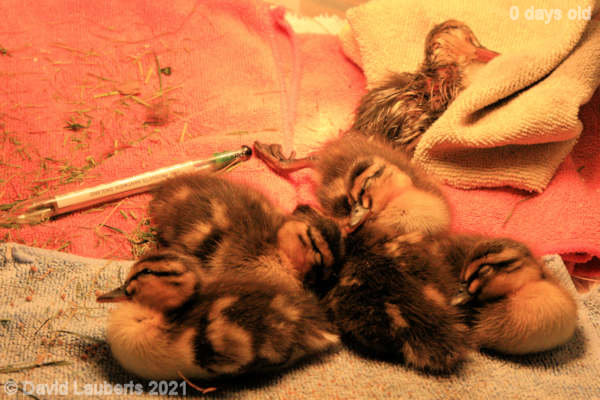
A new friend joins the team 11:37pm 24th April 2021
Meanwhile late in the evening the sixth duckling decided to make an appearance and we quickly put it in brooding box with his five companions. The seventh egg (the sixth to pip and once quite noisy) did not progress, but a couple of others had pipped during the day. The family was set to grow!
In the wild we did wonder what would have happened to our 'nest'? How long would Jemima have stayed on the nest before taking her hatchlings to food and water? If it was twelve hours, then her brood would only have been a group of five. If so, would any of her eggs have continued to hatch without her body heat? In the previous year we certainly did not see any late duckling arrivals after we had taken her to the nature reserve. The chirping of the hatched ducklings while in the nest may also encourage the ones still in the eggs to emerge.
Pondering these weighty matters, we eventually went to bed, after almost 22 hours with our new family.
The Garden Room run and last eggs
The next morning found our little friends active and chirpy. The seventh egg had not hatched.
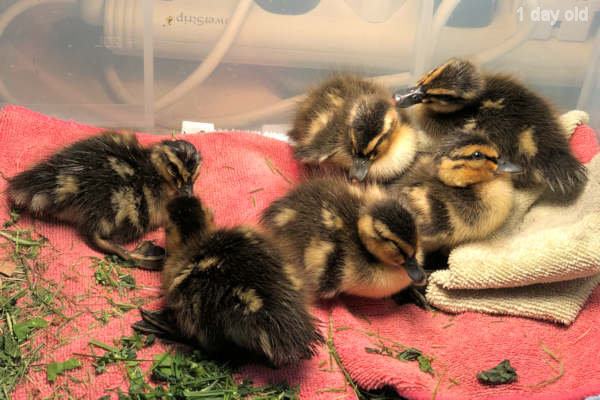
Good morning happy campers 6:32am 25th April 2021
Once again, we raided various parts of the house and garden for things to use to partition an area of the Garden Room, bits of old carpet we've kept for years and not thrown out, cardboard boxes we kept to send stuff if we sold it on eBay, garden seat cushions that were a bit past their presentable stage, books and weights to hold things down and clothes pegs to hold them together.
Another useful idea from online was to use paint roller trays as water baths for them to swim in so a couple of those were pulled out of one of the sheds.
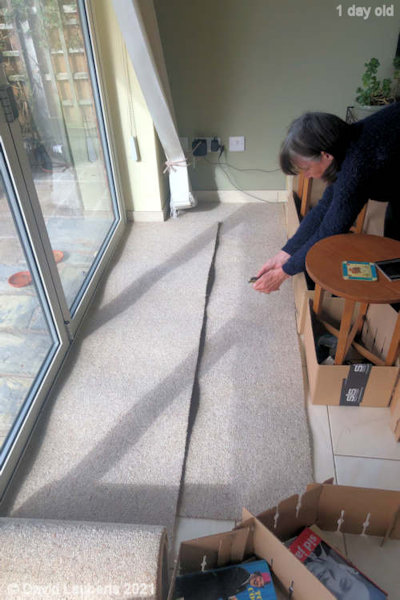
First in the new run 9:32am 25th April 2021
We created an area against the bifold doors, the sides were about 12 to 18 inches high, we hoped it would be high enough to contain them for a while. We did develop and extend this over the next couple of weeks. Last year though they managed to get up 9 inches on to the side of the pond there had been a little shelf to help them up.
After covering most of the area with old pieces of carpet, we introduced them to their new run one by one. They were much more comfortable in the bigger area. They did not like bare tiles, and we soon covered over the exposed areas with cloths before widening the area and laying a further carpet piece.
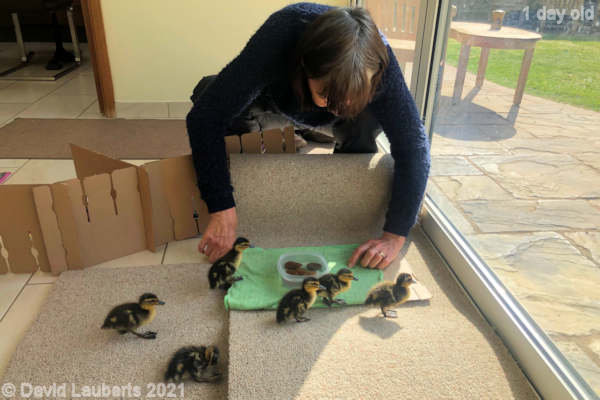
Looking out on their new world 9:36am 25th April 2021
The sun was shining, and you could tell that they longed to get outside, they spent a lot of time walking up and down the bottom of the bifold windows looking out into garden.
Bit by bit we moved stuff in, water, heating lamp, microfibre cloths to lie on, food (their crushed duck food, and we had read the previous night that ground oats was another good food, we had some 'finest large grain gluten free oats' that we pulverised into pieces - that mortar and pestle was really proving its worth - and added water to it in a flat Tupperware lid) and of course the roller paint tray which proved an immediate success. Peas were another online discovery - so out came 'Tesco's finest garden peas' to add to their diet.
One thing we learnt was they are very 'splashy' creatures, both we food and water. Over the coming weeks we ended up placing flat metal trays covered with old dish tea towels underneath the water and food trays to help with the daily cleaning and washing cycle we eventually developed.
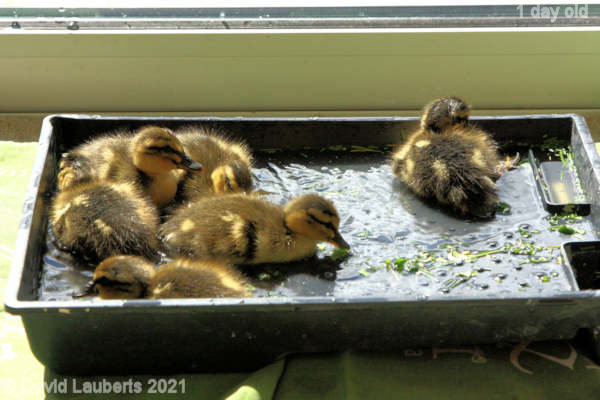
In the new pool 11:22am 25th April 2021
Another challenge we found was how to interact with the little darlings. These were going to be wild ducks and must go back to nature and survive. We did not want them to become too familiar with humans. The ducklings themselves did not want to give us much choice. Though we had heard of ducklings and chicks 'bonding' with the first things they saw it didn't quite seem to work like that. They would quite happily rush round their enclosure in ones and twos or all together, but as soon as they couldn't see us, they would come to come to the edge of the run, chirping away till they could see one of us. As the days went, on they would become louder doing this and also start trying to jump out the enclosure, bouncing off halfway up the cushions and boxes on the side.
When we were in the enclosure they were keen to interact, I suppose like we were 'mother duck', and would snuggle up to us or jump on us to rest or warm themselves up.
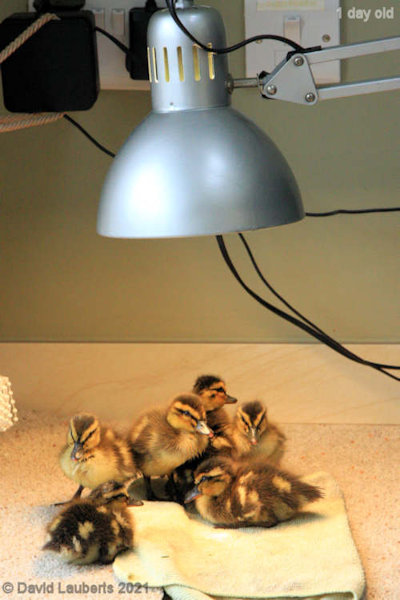
Time to dry under the lamp 11:54am 25th April 2021
We quickly noticed what was to be one of their favourite games for the next few weeks - see who can get to the top of the pile. When they had finished feeding, swimming, and running around they would group together under the lamp on the microfibre cloth and start preening themselves. It was amazing to think this must be behaviour they were born with - we certainly had not taught them it.
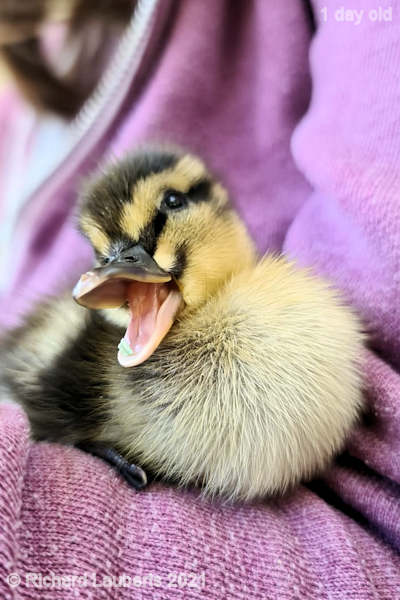
Now this is a duckling 25th April 2021
After they had done this, they would move together in a group, but then see who could get on top of the pile, it was a constant squirming mass of ducklings sometimes as they changed positions, some not bothering to play, some after being forced down climbing back to the top. As they grew older the stronger and larger ones would stand up and the smaller ones would try to clamber up on them as they stood. Perhaps they were trying to establish a pecking order within the group. Sometimes they would split into a couple of piles playing this while some sat around and ignored them. Maybe when they jumped on us and tried to snuggle into us, they were trying to include us in this 'game' of theirs.
It was also quite funny when our son came round and probably took the best duckling picture we have with a quick snap of his phone, despite the fact I had cameras and lens coming out of my ears and the fact we were with them 24 - 7!
Meanwhile we were still concerned about the other eggs, they had pipped 24 hours (or more) ago and we were concerned and not quite sure what to do. The advice online was mixed, some suggested doing nothing, others saying to help them out but be aware it you may do more harm than good. Evening came on, it had been at least 36 hours for all three eggs that had pipped with no action. Perhaps they had stopped trying because they could not hear their brothers and sisters. Another thing we had read was that the shell membrane may dry out through the pip hole, particularly if you kept opening the incubator (which we had) and this would make it harder for the ducklings to hatch.
We decided to have a go and carefully opened the top of the shell using a pair of tweezers to pull bits off from round its pip hole for the longest pipped egg. It was a slow process, but I did manage to extract the duckling from the egg, he did not move around as much as the others had though he did move a little but not far. Sadly, over the next 24 hours it did not really open its eyes or move much and was not interested in food and water. The following evening, on the 26th, he died and the next day we buried him with his mother.
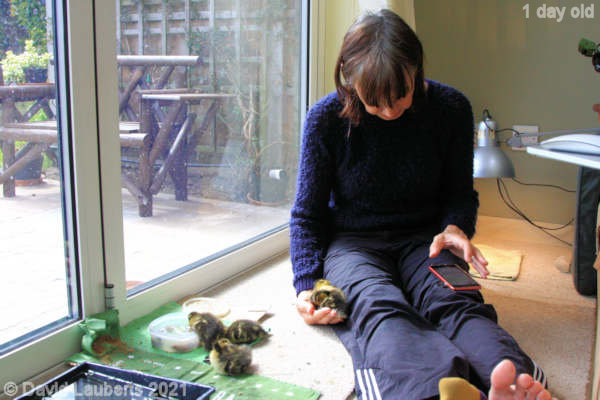
A bird in the hand.... 1:22pm 25th April 2021
We had better luck with the other two pipped eggs, as we removed the shell from round the pip holes and made them bigger, they started to move more, and we did get the odd 'chirp'. After removing the shell and membrane from just air sac end of the egg (just like taking the top of a boiled egg) we left them to squeeze themselves out into the world and dry off before joining their brothers and sisters for the night. There were just five unhatched eggs left.
The next morning two of the three newcomers were bouncing around with the others, our 'open -egg' surgery seemed to have thankfully worked for these youngsters.
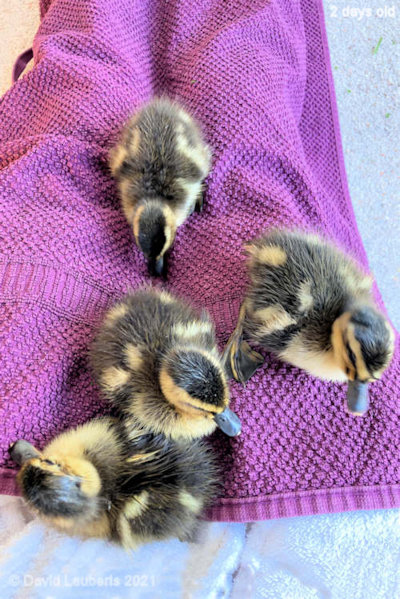
Lapping it up 08:23am 26th April 2021
They were all extremely noisy in greeting us and were all soon the run, except the poorly one, and seemed more interested in clambering in, on and around us than having their breakfast. We started to learn then that ducklings are not toilet trained and started putting old towels on our laps if we went in to sit with them to quieten them down. They loved burrow into the towels, your fleece, shirt, pockets, armpits and try to climb up as far as they can.
Other pleasing sight in the morning was that all the last five eggs had pipped during the night, it was looking like we would get a 100% hatching record. We did wonder what would have happened to these eggs in the wild, if they would have hatched at all, and if they did what would have happened to the ducklings?
The room was still quite congested with bit and pieces, and we soon had to come up with a cleaning plan, for our sanity, and the duckling's benefit. We did more googling about safe disinfectants and soon had them on order from Amazon.
The morning was spent with them chasing round the enclosure, swimming, and resting - lots of resting. They seemed to want the comfort of nestling up to use/on us and were extremely noisy when we were not there.
Mid-morning brought the first of the last five eggs into life, quickly followed by another. We moved them more quickly to the group in the run as they seemed to dry off quicker while crawling over (and being crawled over) by their brothers and sisters.
During this time, we had friends in our lockdown 'bubble' round marvelling at the extended family, and in one case proving that given the chance the ducklings will climb to the highest heights.
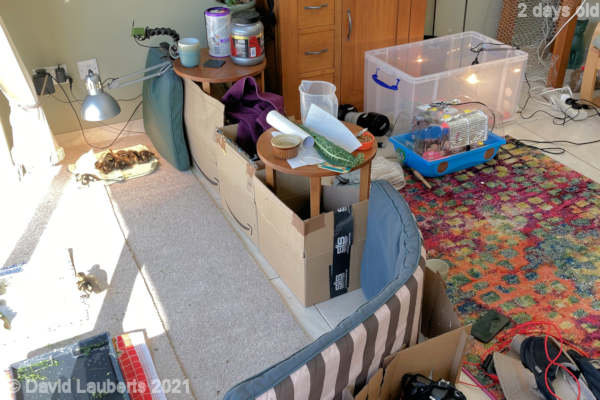
Ducklings taking over the room 08:58am 26th April 2021
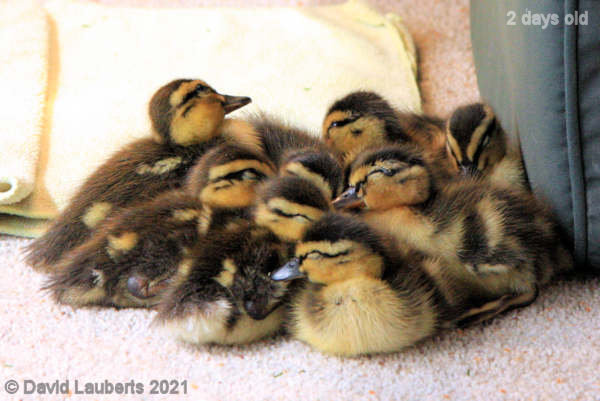
You can't beat sleeping 11:02am 26th April 2021
Our days activities were not complete yet. The ducks that had hatched were getting very restless indoors. We decided that to take the 8 who hatched before the day for their first swim.
Using the large plastic 'brooder' container for a new purpose, after putting a tea towel in the bottom, we placed the 8 eager foundlings into it and carried them to what we call the small pond that has no fish and is for tadpoles, frogs, dragon flies and insects. It was a bit of a disaster really, after putting them onto the edge of the pond they all impatiently jumped in one side, and after a few minutes swimming around, most jumped out the other side.
Though we tried to put them back in the pond they were more keen to explore the garden and scattered to the four points of the garden. It was quite funny watching as they darted round us to get where they wanted to go, not afraid but determined in their own way.
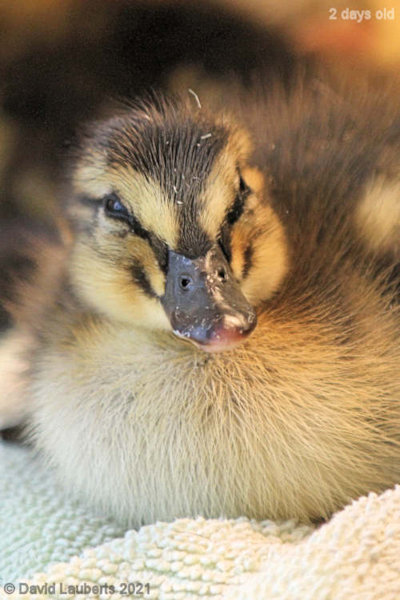
Whats the fuss? 1:34pm 26th April 2021
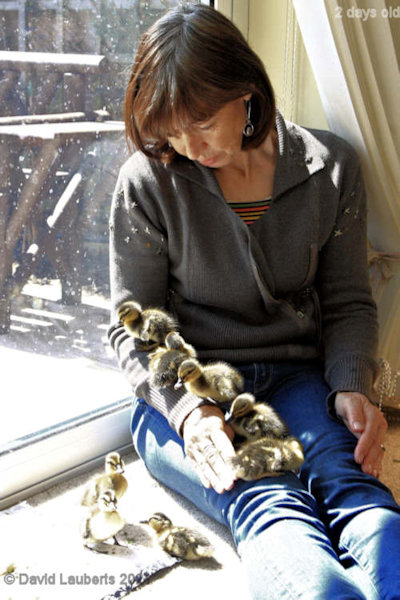
The pecking order 1:07pm 26th April 2021
We scurred around gathering them back up, though it was at first like the previous year gathering Jemima and her brood up, these were not trying to hide but just wanted to explore.
We learnt here you have to try and control them getting in and out the pond, also we had read of all the things they shouldn't eat in the garden (sweet peas and we weren’t sure about comfrey) which was all over this area of the garden. We resolved to use the 'big pond' next time which has 'high sides' round most of it and access is via a shallow area.
They even started to run back towards the bi-fold doors and back inside.
The afternoon wore on and by come a further two eggs made the break for freedom just leaving a sole egg in the incubator.
The evening was starting as the last duckling noisily made its exit at 6:54pm. This was about 56 hours (2 and 3/4 days) after the first one hatched. After an hour drying off on its own in the nest it joined the rest of the team in the run. All was complete, 14 had hatched with 13 healthy ducklings all snuggling down together.
Night-time fell, and we decided to leave them in the run for the night rather than the brooder to give them more room. This did entail hasty re-arrangements by phone with our house alarm company so their movements in the garden room did not trigger the movement alarms! We moved into day 4 of the adventure with our duckling dependents after a very emotional and exhilarating day.
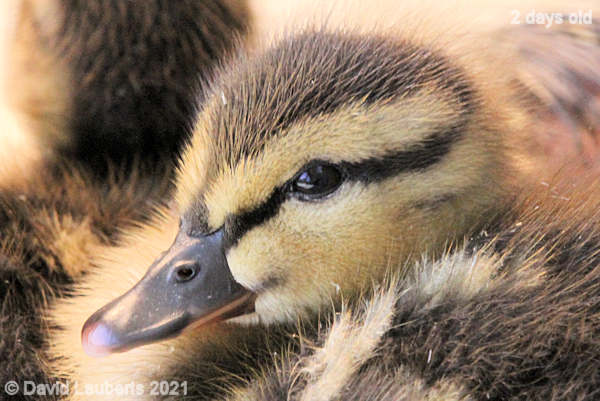
Here's looking at you kid 1:34pm 26th April 2021
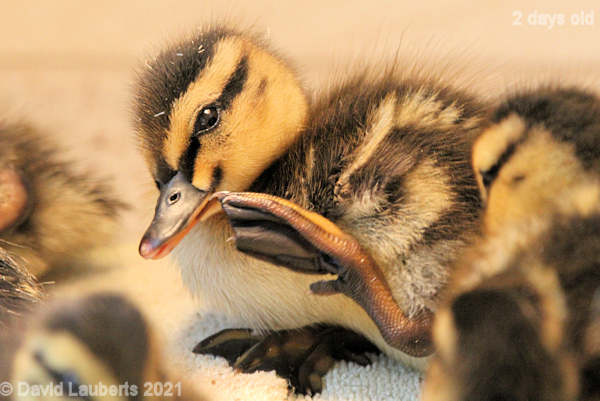
Bit of an itch 1:35pm 26th April 20211
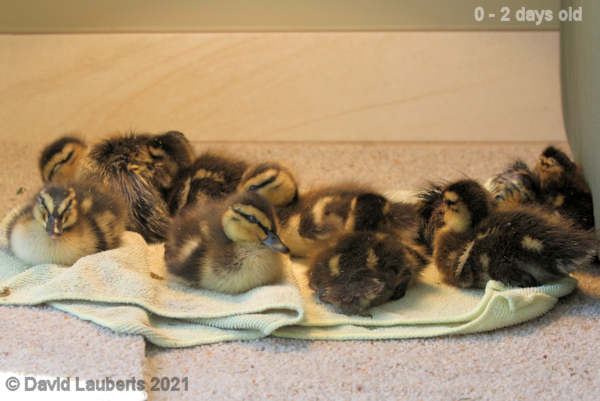
10 together 1:36pm 26th April 2021
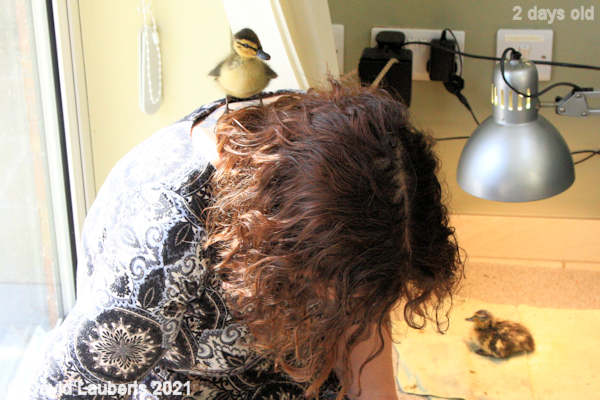
Which way down? 3:10pm 26th April 2021
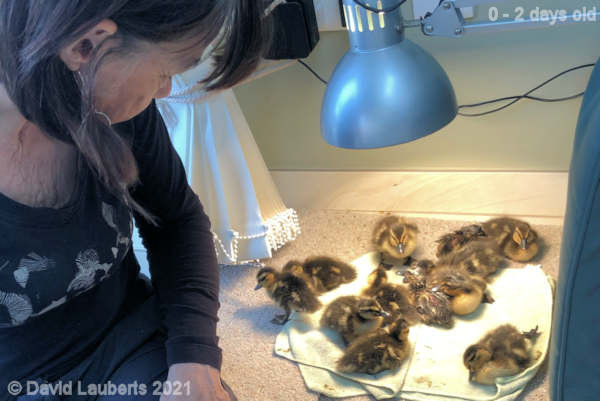
Another straggler 5:26pm 26th April 2021
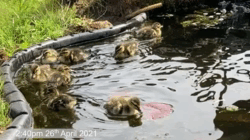
First outdoor swim 2:40pm 26th April 2021
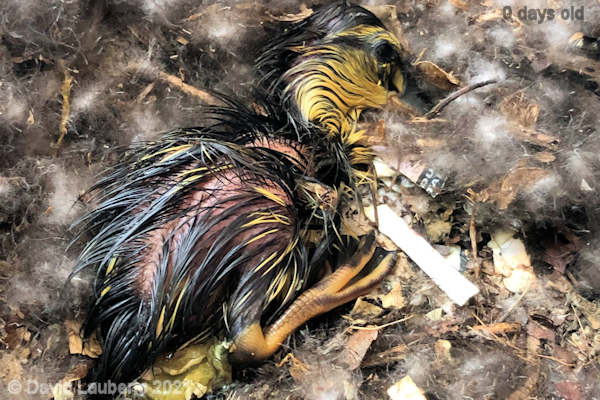
Last duckling hatches 6:54pm 26th April 2021
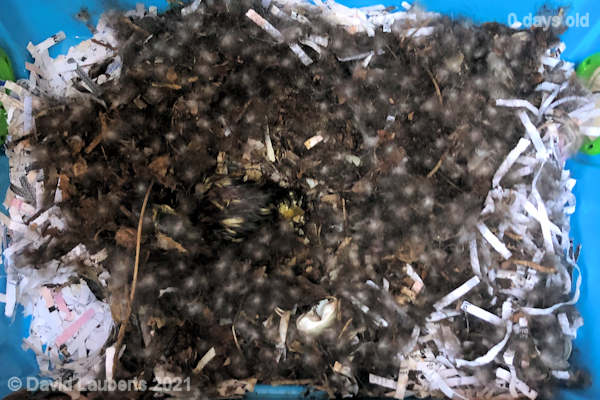
All alone in my nest 8:00pm 26th April 2021
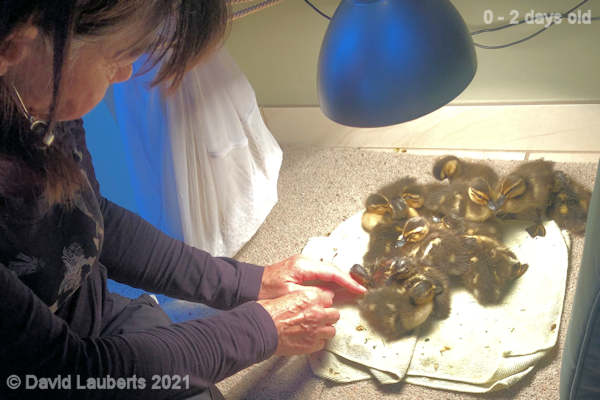
Last one joins the happy band 8:00pm 26th April 2021
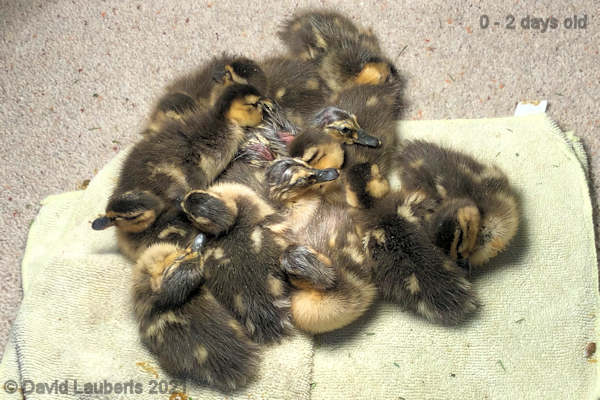
13 snuggle down for the first time 8:06pm 26th April 2021